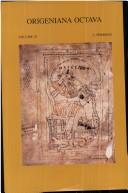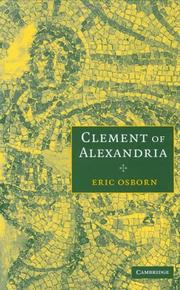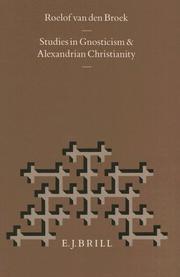| Listing 1 - 10 of 13 | << page >> |
Sort by
|
Book
ISBN: 8879610406 9788879610407 Year: 1997 Volume: 57 Publisher: Roma Institutum patristicum Augustinianum
Abstract | Keywords | Export | Availability | Bookmark
 Loading...
Loading...Choose an application
- Reference Manager
- EndNote
- RefWorks (Direct export to RefWorks)
Prayer --- Alexandrian school, Christian --- Christianity --- Congresses --- #GOSA:II.P.ORI.M --- Alexandrian theology --- Christian Alexandrian school --- Origen. --- Worship --- Prayers --- Theology, Doctrinal --- Antiochian school --- History --- Prayer - Christianity - Congresses --- Alexandrian school, Christian - Congresses.
Book
ISBN: 091564603X 9780915646036 Year: 1976 Volume: 4 Publisher: Cambridge Philadelphia Patristic foundation
Abstract | Keywords | Export | Availability | Bookmark
 Loading...
Loading...Choose an application
- Reference Manager
- EndNote
- RefWorks (Direct export to RefWorks)
God (Christianity) --- Transcendence of God --- Alexandrian school, Christian --- Knowableness --- History of doctrines --- 276.016.0 x --- God --- -Transcendence of God --- Alexandrian theology --- Christian Alexandrian school --- Theology, Doctrinal --- Antiochian school --- Divine transcendence --- Metaphysics --- Misotheism --- Monotheism --- Religion --- Theism --- Patrologie. Patristiek--?.016--?.0 --- -History of Doctrines --- History --- Transcendence --- Knowableness&delete& --- History of Doctrines --- Christianity --- Trinity --- God (Christianity) - Knowableness - History of doctrines
Book
ISBN: 9004375716 9789004375710 9781108646802 9781108375712 9781108481182 9781108740432 1108481183 110874043X 9004366865 1108646808 110858280X 9789004366862 1108602851 Year: 2019 Publisher: Cambridge, United Kingdom Cambridge University Press
Abstract | Keywords | Export | Availability | Bookmark
 Loading...
Loading...Choose an application
- Reference Manager
- EndNote
- RefWorks (Direct export to RefWorks)
"What did dreams mean to Egyptian Christians of the first to the sixth centuries? Alexandrian philosophers, starting with Philo, Clement and Origen, developed a new approach to dreams that was to have profound effects on the spirituality of the medieval West and Byzantium. Their approach, founded on the principles of Platonism, was based on the convictions that God could send prophetic dreams and that these could be interpreted by people of sufficient virtue. In the fourth century, the Alexandrian approach was expanded by Athanasius and Evagrius to include a more holistic psychological understanding of what dreams meant for spiritual progress. The ideas that God could be known in dreams and that dreams were linked to virtue flourished in the context of Egyptian desert monasticism. This volume traces that development and its influence on early Egyptian experiences of the divine in dreams"--
E-books --- Dreams --- Alexandrian school, Christian --- Theology, Doctrinal --- Knowledge, Theory of (Religion) --- Virtue --- Conduct of life --- Ethics --- Human acts --- Alexandrian theology --- Christian Alexandrian school --- Antiochian school --- Dreaming --- Subconsciousness --- Visions --- Sleep --- Epistemology, Religious --- Religious epistemology --- Religious knowledge, Theory of --- Religion --- Religious aspects&delete& --- Christianity --- History --- Philosophy --- Alexandrian school, Christian. --- Virtue. --- Religious aspects --- Christianity.
Book
ISBN: 9781443881227 1443881228 9781443880015 1443880019 Year: 2015 Publisher: Newcastle upon Tyne, England : Cambridge Scholars Publishing,
Abstract | Keywords | Export | Availability | Bookmark
 Loading...
Loading...Choose an application
- Reference Manager
- EndNote
- RefWorks (Direct export to RefWorks)
"This volume brings together contributions exploring a range of aspects of the Alexandrian patristic tradition from the second half of the second century to the first half of the fifth century, a tradition whose complex and significant legacy is at times misunderstood and, in some quarters, wholly neglected. With contributions by both Australian and international scholars, the fourteen chapters here highlight that, behind the complexity of this tradition, one finds a vibrant Christian spirit - granted, one that has successfully put on the flesh of Hellenistic culture - and a consistent striving towards the reformation and transformation of the human being according to the gospel. Furthermore, this volume contributes a nuanced voice to the scholarly choir which already hums a new song about Christian Alexandria and its representatives. Indeed, these contributions are interdisciplinary in approach, combining methods pertaining to the fields of historiography, theology and philosophy, pastoral care, hermeneutics, hagiography, and spirituality. By way of this complex approach, this book brings together areas which currently evolve in separate scholarly universes, which is wholly befitting to the complexities entailed by the ever-challenging Alexandrian legacy."--Publisher's website.
Alexandrian school, Christian. --- Church history --- Philosophy and religion --- Christianity and philosophy --- Religion and philosophy --- Religion --- Apostolic Church --- Christianity --- Church, Apostolic --- Early Christianity --- Early church --- Primitive and early church --- Primitive Christianity --- Fathers of the church --- Great Apostasy (Mormon doctrine) --- Alexandrian theology --- Christian Alexandrian school --- Theology, Doctrinal --- Antiochian school --- History

ISBN: 9042912014 9058673561 2877236730 9789042912014 Year: 2003 Volume: 164 Publisher: Leuven Leuven University Press
Abstract | Keywords | Export | Availability | Bookmark
 Loading...
Loading...Choose an application
- Reference Manager
- EndNote
- RefWorks (Direct export to RefWorks)
Origen --- Influence --- Congrès --- Alexandrian school, Christian --- Alexandria (Egypt) --- 276 =75 ORIGENES --- Alexandrian theology --- Christian Alexandrian school --- Theology, Doctrinal --- Antiochian school --- Griekse patrologie--ORIGENES --- History --- Adamantius, --- Oregenes Adamantius, --- Origene --- Origenes Adamantius, --- Origenes, --- Origenis --- Orygenes --- Ūrījānūs --- Criticism and interpretation --- Iskandarīyah (Egypt) --- Alexandrie (Egypt) --- Aleksandriyah (Egypt) --- Alessandria (Egypt) --- Alexandreia (Egypt) --- Aleksandria (Egypt) --- Alexantreia (Egypt) --- Alesandriʼa (Egypt) --- الإسكندرية (Egypt) --- الإسكندرية (مصر) --- اسكندرية (Egypt) --- Intellectual life --- Conferences - Meetings --- Congresses --- Congrès. --- Alexandrian school, Christian - Congresses --- Origen - Congresses --- Alexandria (Egypt) - Intellectual life - Congresses

ISBN: 0521837537 9780521837538 9780511734922 9780521090810 0521090814 0511734921 Year: 2005 Publisher: Cambridge Cambridge University Press
Abstract | Keywords | Export | Availability | Bookmark
 Loading...
Loading...Choose an application
- Reference Manager
- EndNote
- RefWorks (Direct export to RefWorks)
Clement of Alexandria (150-215) lived and taught in the most lively intellectual centre of his day. This book offers a comprehensive account of how he joined the ideas of the New Testament to those of Plato and other classical thinkers. Clement taught that God was active from the beginning to the end of human history and that a Christian life should move on from simple faith to knowledge and love. He argued that a sequence of three elliptical relations governed the universe: Father and Son, God and humanity, humans and their neighbours. Faith as a fixed conviction which is also a growing mustard seed was joined to Plato's unwavering search for the best reason. The open heaven of prophecy became intelligible through Plato's ascending dialectic. This book will be invaluable in making this outstanding thinker of the early Church accessible to the students of today.
Philosophy and religion --- Alexandrian school, Christian. --- Philosophie et religion --- Ecole chrétienne d'Alexandrie --- History of doctrines --- Histoire --- Clement, --- 276 =75 CLEMENS ALEXANDRINUS --- Griekse patrologie--CLEMENS ALEXANDRINUS --- Ecole chrétienne d'Alexandrie --- Alexandrian school, Christian --- Christianity and philosophy --- Religion and philosophy --- Religion --- Alexandrian theology --- Christian Alexandrian school --- Theology, Doctrinal --- Antiochian school --- History --- Clemens, --- Clemens, Titus Flavius, --- Clément, --- Clemente, --- Klemens, --- Klēmens, --- Kliment, --- Titus Flavius Clemens, --- إكليمنضس السكندري --- Clement of Alexandria --- Klēmēs, --- Arts and Humanities --- Philosophy and religion - History of doctrines - Early church, ca. 30-600. --- Clement, - of Alexandria, Saint, - ca. 150-ca. 215.
Book
ISBN: 3460031344 9783460031340 Year: 2007 Volume: 213 Publisher: Stuttgart Katholisches Bibelwerk
Abstract | Keywords | Export | Availability | Bookmark
 Loading...
Loading...Choose an application
- Reference Manager
- EndNote
- RefWorks (Direct export to RefWorks)
Alexandrian school, Christian --- Theology, Doctrinal --- Christianity and culture --- History --- Alexandria (Egypt) --- Intellectual life --- #GGSB: Christendom --- 281.3 --- Kerk voor het Concilie van Nicea:--100 tot 325 --- 281.3 Kerk voor het Concilie van Nicea:--100 tot 325 --- Contextualization (Christian theology) --- Culture and Christianity --- Inculturation (Christian theology) --- Indigenization (Christian theology) --- Culture --- Alexandrian theology --- Christian Alexandrian school --- Antiochian school --- Iskandarīyah (Egypt) --- Alexandrie (Egypt) --- Aleksandriyah (Egypt) --- Alessandria (Egypt) --- Alexandreia (Egypt) --- Aleksandria (Egypt) --- Alexantreia (Egypt) --- Alesandriʼa (Egypt) --- الإسكندرية (Egypt) --- الإسكندرية (مصر) --- اسكندرية (Egypt) --- Intellectual life. --- Christendom --- Theology, Doctrinal - History - Early church, ca. 30-600 --- Christianity and culture - Egypt - Alexandria --- Alexandria (Egypt) - Intellectual life
Book
ISSN: 0920623X ISBN: 9789004174825 9004174826 9786612601897 9047428285 128260189X 9789047428282 Year: 2009 Volume: 97 Publisher: Leiden Boston Brill
Abstract | Keywords | Export | Availability | Bookmark
 Loading...
Loading...Choose an application
- Reference Manager
- EndNote
- RefWorks (Direct export to RefWorks)
The Stromateis of Clement of Alexandria (c.150-215 CE) has received much scholarly debate over whether it can be accorded the role of the third and highest phase of his pedagogy. This was a treatise that promised an account of the true philosophy of Christ set down for Christians seeking higher knowledge of doctrine. This book takes a new approach to deciphering the nature and purpose of these enigmatic books concentrating on the close relationship between method and doctrine, and the number and sequence of the texts as they have come down to us. The outcome is a concise summary of current scholarship on Clement’s method and a fresh picture of how he applies it to the transmission of esoteric doctrines.
Theology --- History --- Clement, --- 276 =75 CLEMENS ALEXANDRINUS --- Griekse patrologie--CLEMENS ALEXANDRINUS --- Alexandrian school, Christian. --- Christianity and other religions --- Gnosticism --- Ecole chrétienne d'Alexandrie --- Christianisme --- Gnosticisme --- Théologie --- Gnosticism. --- Relations --- Christianity. --- Histoire --- Alexandrian school, Christian --- Cults --- Christianity --- Syncretism (Christianity) --- Religions --- Alexandrian theology --- Christian Alexandrian school --- Theology, Doctrinal --- Antiochian school --- Relations&delete& --- Clemens, --- Clemens, Titus Flavius, --- Clément, --- Clemente, --- Klemens, --- Klēmēs, --- Kliment, --- Titus Flavius Clemens, --- إكليمنضس السكندري --- Theology - History - Early church, ca. 30-600. --- Clement, - of Alexandria, Saint, - ca. 150-ca. 215. - Stromata

ISBN: 9004106545 9004439684 9789004106543 9789004439689 Year: 1996 Volume: 39 Publisher: Leiden Brill
Abstract | Keywords | Export | Availability | Bookmark
 Loading...
Loading...Choose an application
- Reference Manager
- EndNote
- RefWorks (Direct export to RefWorks)
The discovery of the Nag Hammadi Library (1945) has given an enormous impetus not only to the study of ancient Gnosticism but also to that of early Christianity in general. Most of the studies contained in this volume deal with mythological conceptions and theological ideas found in various Nag Hammadi writings. The gnostic views on the nature of God and on creation and salvation receive particular attention, ranging from Philo to the medieval Cathars. The Nag Hammadi Library also shed new light on the development of early Alexandrian Christianity and its theology. The book contains six studies which explicitly deal with these topics. This volume is of interest to students of Gnosticism, early Christianity and Graeco-Roman religious and philosophical ideas in general.
Alexandrian school --- Alexandrian school [Christian ] --- Alexandrie [Ecole chretienne d'] --- Alexandrie [Ecole d'] --- Alexandrijnse school --- Alexandrijnse school [Christelijke ] --- Ecole d'Alexandrie --- Gnose --- Gnosis --- Gnosticism --- Gnosticisme --- Hermeticism --- Hermetism --- Hermetisme --- Hermétisme --- Gnosticism. --- Hermetism. --- Alexandrian school. --- Alexandrian school, Christian. --- Ecole philosophique d'Alexandrie --- Ecole chrétienne d'Alexandrie --- Alexandria (Egypt) --- Alexandrie (Egypte) --- Intellectual life. --- Vie intellectuelle --- 273.1*11 --- Alexandrian School --- Alexandrian school, Christian --- Occultism --- Alexandrian theology --- Christian Alexandrian school --- Theology, Doctrinal --- Antiochian school --- Neoplatonism --- Gnosis en christendom --- History --- -Intellectual life --- 273.1*11 Gnosis en christendom --- Hermétisme --- Ecole chrétienne d'Alexandrie --- -Iskandarīyah (Egypt) --- Alexandrie (Egypt) --- Aleksandriyah (Egypt) --- Alessandria (Egypt) --- Alexandreia (Egypt) --- Aleksandria (Egypt) --- Alexantreia (Egypt) --- Alesandriʼa (Egypt) --- الإسكندرية (Egypt) --- الإسكندرية (مصر) --- اسكندرية (Egypt) --- Intellectual life --- Iskandarīyah (Egypt) --- Cults
Book
ISBN: 9783161497292 Year: 2009 Volume: 52 Publisher: Tübingen Mohr Siebeck
Abstract | Keywords | Export | Availability | Bookmark
 Loading...
Loading...Choose an application
- Reference Manager
- EndNote
- RefWorks (Direct export to RefWorks)
248.2 "04/14" --- 271 <32> --- Mystieke theologie. Mystiek. Mysticisme--Middeleeuwen --- Kloosterwezen. Religieuze orden en congregaties. Monachisme--Oud-Egypte --- 248.2 "04/14" Mystieke theologie. Mystiek. Mysticisme--Middeleeuwen --- Alexandrian school, Christian --- God (Christianity) --- Monastic and religious life --- Monasticism and religious orders --- Mystical union --- Visions --- Parapsychology --- Religion --- Visionaries --- God and man, Mystical union of --- Indwelling of God --- Mystic union --- Unio mystica --- Union, Mystical --- Union with Christ --- Immanence of God --- Mysticism --- Monachism --- Monastic orders --- Monasticism and religious orders for men --- Monasticism and religious orders of men --- Orders, Monastic --- Orders, Religious --- Religious orders --- Brotherhoods --- Christian communities --- Brothers (Religious) --- Friars --- Monks --- Superiors, Religious --- Christianity --- Trinity --- Alexandrian theology --- Christian Alexandrian school --- Theology, Doctrinal --- Antiochian school --- Knowableness --- History of doctrines --- History --- Anthony, --- Anbā Anṭūnīyūs, --- Anthony the Abbot, --- Antoine, --- Antoniĭ Velikiĭ, --- Antonio, --- Antonius, --- Antonius Magnus, --- Antony, --- Qiddīs Anṭūnīyūs, --- قديس مصر أنطونيوس --- Authorship. --- Anton,
| Listing 1 - 10 of 13 | << page >> |
Sort by
|

 Search
Search Feedback
Feedback About UniCat
About UniCat  Help
Help News
News